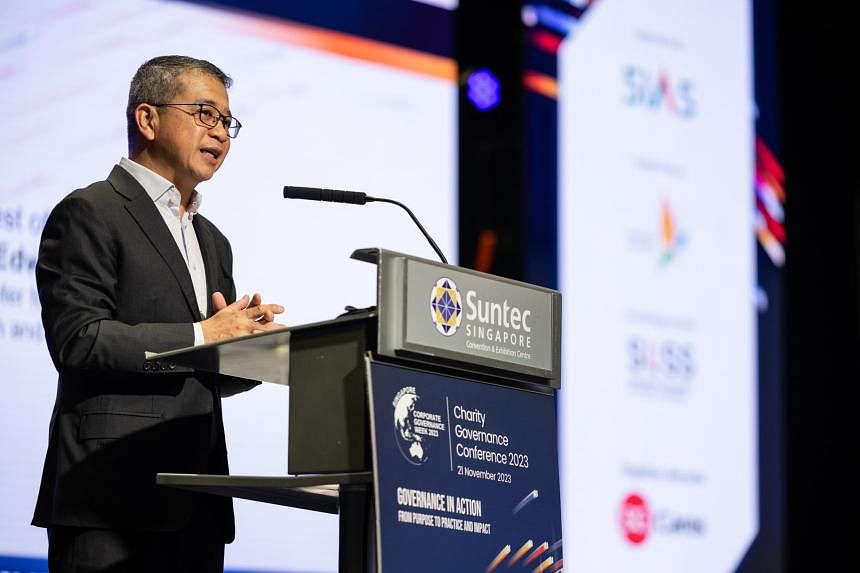SINGAPORE - Guidelines are being relaxed for private and community foundations to allow them to do more than give grants to charities and other beneficiaries.
Under the new Guidance on Regulation of Grantmakers, foundations will be allowed to conduct activities such as doing research, serving beneficiaries directly, and issuing loans and social impact bonds. With such bonds, philanthropists provide funding to charities to create a social impact and pass part of the returns to investors.
However, such non-grantmaking activities are limited to 10 per cent of the grantmakers’ total activities.
The new rules, aimed at developing Singapore as a regional philanthropy hub, will take effect from Jan 1, 2024.
Minister for Culture, Community and Youth Edwin Tong, who was the guest of honour at the annual Charity Governance Conference on Nov 21, said: “These changes, in our view, help to promote the good work of grantmakers, giving them a little bit of flexibility... but still fundamentally maintaining a core principle of transparency, governance, and a strong sense of accountability.”
Grantmakers have to meet a set of criteria to qualify for the relaxed guidelines.
For instance, they have to be a non-profit and a non-governmental organisation, and solely funded by an individual, family or institution.
They also cannot be a registered Institution of a Public Character, which refers to a charity that is allowed to collect tax-deductible donations.
Examples of eligible grantmakers include Lee Foundation and CapitaLand Hope Foundation.
Mr Tong also announced the new Charity Compliance Indicator to promote greater accountability, and a supplementary Risk Management Toolkit for charities.
The Charity Compliance Indicator will publish information on charities’ profile pages on the Charity Portal, including the charities’ fund-raising efficiency ratio (the amount a charity spends to raise a dollar) and the scores of their governance evaluation checklist.
This would allow donors and the public to better understand how well the charities comply with regulatory requirements. This compliance indicator will be launched in January 2024.
The toolkit, to be launched in early 2024, provides guidelines on incorporating environmental, social and corporate governance considerations into charities’ risk management practices.
Mr Tong said: “Let us not shy away from scrutiny, but welcome it as an opportunity to learn, to improve, to innovate, and to do better.”
Eighty charities received awards at the Charity Transparency and Governance Awards, which took place after the conference held at the Suntec Singapore Convention and Exhibition Centre. The Singapore Cancer Society and Touch Family Services took home the Charity Governance Award, the event’s highest accolade.
Mr Albert Ching, chief executive of the Singapore Cancer Society, said the charity hired a regulatory assurance manager in March 2023 to ensure that the various departments are complying with regulations.
The charity also has Workplace, a platform on social networking app Facebook for staff and beneficiaries to stay updated on developments in the organisation, and to communicate with management.
The organisation also looks out for larger donations and abnormalities, such as special requests for donations to be used in ways that would benefit the donor.
Mr James Tan, CEO of Touch Family Services, said the charity regularly reviews its internal controls, policies, key programmes and partnerships to protect against fraud, money laundering and support for terrorism. It also has financial controls to discern who its donors and partners are, and how donations came about.
Mr Lee Meng Tat, chairman of the Singapore Cancer Society, suggested that a database of people to be careful of could help to protect charities.
On the relaxed rules for grantmakers, he said: “Increasingly, for people who are willing to donate to charities, it’s not just giving the money; it’s about doing something that makes a difference.
“So I think giving grantmakers more leeway in terms of how to finance it, such as by offering bonds, could be more innovative, provide a more sustained form of provisions over the years, and also target funding to programmes that will make a big impact.”


